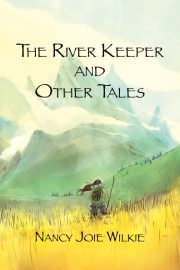Nebula Awards 2010 Interview: Christopher Kastensmidt
by Marshall Payne
 Christopher Kastensmidt was born in Texas but has lived in Porto Alegre, Brazil for the last decade. He ran video game developer Southlogic Studios for ten years and later served as Creative Director of Ubisoft Brazil, participating in the production of thirty video games in the process.
Christopher Kastensmidt was born in Texas but has lived in Porto Alegre, Brazil for the last decade. He ran video game developer Southlogic Studios for ten years and later served as Creative Director of Ubisoft Brazil, participating in the production of thirty video games in the process.
Christopher has a bachelor’s degree in Electrical and Computer Engineering from Rice University and is nearing the end of a master’s degree in Social Communication at PUCRS. He currently works as a professor, lecturing at three different universities, and as an independent consultant. He specializes in digital narratives, intellectual property creation, and video game production. His fiction has appeared in eight countries.
To learn more about The Elephant and Macaw Banner series, please visit the website www.eamb.org, where Christopher posts news, artwork, and in-depth explanations of historical and cultural references used in the stories.
“The Fortuitous Meeting of Gerard van Oost and Oludara” introduces the two titular characters, one a Dutch adventurer, one an African slave brought to Brazil. Where did this idea come from?
I can’t take credit for any exceptional revelation there; those characters are based on Brazilian history. Sixteenth-century Brazil witnessed a massive culture shock. Europeans, Africans, and Native Brazilians converged on the coast where they met, mixed, and eventually came to form the Brazilian people and culture we know today.
So Gerard van Oost and Oludara represent that convergence. At the same time, I chose to begin the story upon their arrival and have them discover that unusual place a little bit at a time, and in doing so give the same experience to the reader unfamiliar with Brazilian culture.
Brazil was a remarkable place at the time, unimaginable to Europeans. Even today, people who aren’t familiar with Brazilian history challenge me on historical points I deal with in the stories–like cannibalism and nakedness among the tribes–but that was the reality of the time. The Brazilian colonial period shouldn’t be confused with that of the rest of the Americas; it is unique in many ways.
This novelette could be called sword and sorcery, a retake on epic fantasy, a cultural adventure story set in the New World. How do you perceive this?
It’s not a surprise, since I’m a lifelong fan of all those genres. In this first story, I think the sword and sorcery influence is the most obvious. Fritz Leiber had no small part inspiring this adventuring duo. But the influences don’t stop there: Robin Hood, Dumas, and countless other adventure stories played a part. Historical fiction has been a huge influence. Mythology and folklore also play a part in my writing, but I think those other influences will become more obvious as other stories are published.
If I had to choose a label myself, I’d call the stories historical fantasy, but in the end, it doesn’t really matter how they’re classified. It’s nice that people place them in so many different categories. I hope that means they have a wide breadth of audience.
What was the hardest part in writing “Fortuitous Meeting”? The easiest?
The research was a killer. To date, I have a library of over two-hundred books on history, culture, and folklore from that period, most of them in Portuguese. I don’t know how many hours I spend researching vs. writing, but the ratio is huge. I could fudge the history more and increase my output, but I refuse to skimp. I’m passionate about history and about this world I’m creating, and I want to get things right.
I don’t know if there is an easiest part. The time I’ve spent researching and revising these stories beats the time I’ve spent on all my other writing put together.
I suppose the only easy part is doing interviews!
You set up a website, The Elephant and Macaw Banner, devoted to this world. Please tell us about that.
As a reader, I tend to explore far beyond the books themselves. When I read historical fiction, for example, I’ll sometimes spend days studying the history and culture of the period. So I hope some of my readers want to know more about Brazilian folklore and culture, and I came up with the website as a way to facilitate that search.
As I mentioned above, I spent so much time researching I lost track. I collected much of that research into documents, but only a fraction of it goes into the stories, just the details necessary for the narrative. So I use the website as a way to discuss story elements in more depth. It’s a present to the dedicated readers, and at the same time a channel for them to comment and share information with me as well.
The site has also become a place for me to post series news and artwork. I have feeds going to Twitter, LiveJournal, Facebook, and RSS, so it’s easy for anyone to keep up with everything going on there, no matter what their social media of choice.
For those interested, you can find the site at:
There are more stories in the works concerning the adventures of Gerard and Oludara. What can you tell us about those?
I’ve written several other stories set in the world, and I hope to find them nice homes in short fiction publications. I have a novel planned that ties all those stories together, and a couple more novels planned after that. I’d like to finish the first novel in 2012, but my research and writing time is limited by other commitments.
I’m also working on a graphic novel of “Fortuitous Meeting” in conjunction with Carolina Mylius, and excellent fantasy artist (http://shantalla.deviantart.com/gallery/). I hope to finish that later this year and publish it sometime in 2012.
I have thirteen years of experience in the entertainment industry which has opened me up to different media. That’s why I work with artists, to see other visions for the world, and provide something for the more visual reader. Literature is my first love, but I no longer think of The Elephant and Macaw Banner as just a collection of stories, but rather a world waiting to generate countless narratives in different mediums.
Tell us about your early life and upbringing.
I was born on a dark and stormy night in Texas. Or maybe it was a bright and sunny day. I honestly don’t remember.
What I do remember is how my father would take me to the local library every weekend, where I plowed through most of the kids’ section before moving on to adult literature when I was nine or ten. By fifth grade I had read Homer, Tolkien, Stephen R. Donaldson, and countless others. Writing was my destiny.
I eventually studied at Rice University where I was torn between History and Computer Engineering. I opted for the latter, but not before taking a lot of the former. California called and I worked at Intel for a while before “discovering” Brazil.
You’ve lived in Porto Alegre, Brazil for the past ten years. What’s life like there?
Life here is different yet the same. The entertainment culture is similar, and Brazil has one of the largest cultural outputs in the world, although unfortunately very little of it makes it to the United States.
What’s different are the attitudes. Brazil is more laid back. It took me a little while to get used to it, but I know now I’d have a harder time readapting to the United States, where the stress level runs high. If you’re willing to give up some of the material comforts you have in the U.S., it’s fairly easy to live a satisfying and relaxing life here.
That’s why I don’t ever plan on leaving; Brazil is the place for me. I met my Brazilian wife nine years ago and we’ve been married for seven. We have a two-year-old boy named Lynx, which is an even more unusual name in Portuguese than English!
What’s the Brazilian SF/F scene like?
The amount of published speculative fiction has grown almost exponentially in the last few years, but that required a society-level change in perception. For a long time, all Brazilian fantasy and science fiction was automatically classified as children’s literature–even works with explicit sex, violence and adult themes. The reasoning was something along the lines of: “fantasy worlds are for children, adults should grow up and deal with realism, not escapism.” I think part of that attitude comes from the fact that reality can be extremely harsh here, and people have a certain duty to confront and help resolve social issues.
Fortunately, some Brazilian authors have long realized that speculative fiction can be used to deal with these same issues. Ignácio de Loyola Brandão is a great example of this. His book Zero (1975) confronted the Brazilian military dictatorship, and Não Verás País Nenhum (1981) is the most brilliant fictional piece on global warming and the environment I’ve ever read.
But for years, only specialty publishers would distribute speculative fiction, and it was more a labor of love than a commercial success.
Then a few years ago, things started to chance. People began reading more and more speculative fiction, and the genre could no longer be ignored. Major publishers took note and created their own speculative fiction imprints. And as a group they could demand separate shelf space.
And now the mainstream press has finally caught on. Even Veja, the largest and most prestigious Brazilian magazine, recently published a cover page article on the Harry Potter generation, and how they learned important values through fantasy.
So it’s a great time for speculative fiction writers here, and there are a lot of anthologies coming out to discover new talent.
I’d like to help more of these authors get discovered by the English-speaking world. If any editors out there are interested, please let me know.
What are you working on that’s not related to the above series?
I quit my job as Creative Director of Ubisoft Brazil last year to move on to other things. For the moment, I continue doing video game related work, mostly teaching and consulting. I give classes on video games at three different universities and I’m finishing up a master’s degree in social communication.
I’m attempting to steer my career toward more writing-related activities, starting with the academic side. This semester I’m giving a class entitled “Narratives in the Digital Age,” and I’m planning other writing classes for the future.
Another idea is freelance writing work. I recently received some interest from a TV producer for script writing and some offers for Portuguese-to-English translation work, so I may be doing one or both of those soon.
I’m participating in several literary events this year–two of them as an invited guest. I’ve also accepted invites to participate in three Brazilian anthologies.
In other words, I’m keeping busy!
Where would you like to see your career in five years?
I’ve discovered over the years that the writing-related jobs always make me happier than any other work I’ve ever done. So I hope to keep the course I’ve started and try to make a career out of writing, whether it’s related to academics, freelance, my own projects, or all of those put together. If within five years I can make a living wage off writing, that will be a huge success.
 Marshall Payne has worked as a touring musician, music producer, sound technician, a salesman, and a waiter. He has written over 100 short stories and his fiction has appeared in Aeon Speculative Fiction, Brutarian, Talebones, Hub Magazine, Triangulation: End of the Rainbow, to name a few. For more information, visit his blog or website.
Marshall Payne has worked as a touring musician, music producer, sound technician, a salesman, and a waiter. He has written over 100 short stories and his fiction has appeared in Aeon Speculative Fiction, Brutarian, Talebones, Hub Magazine, Triangulation: End of the Rainbow, to name a few. For more information, visit his blog or website.


